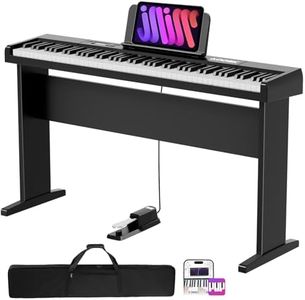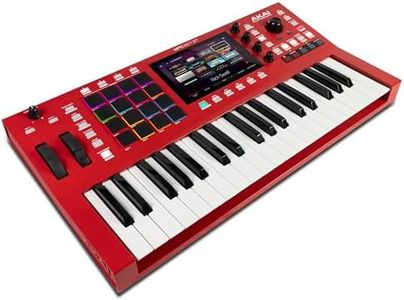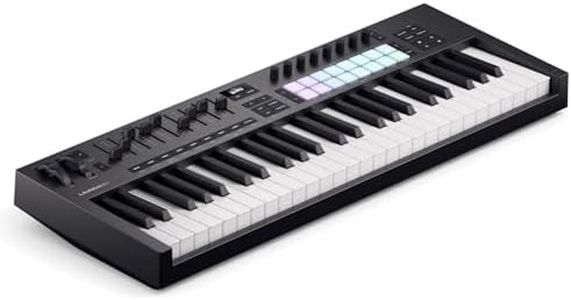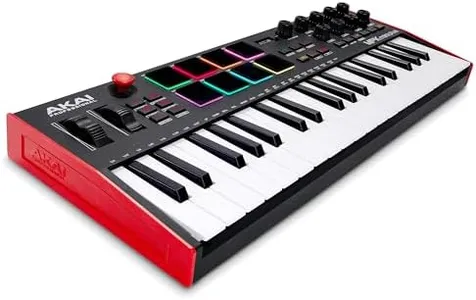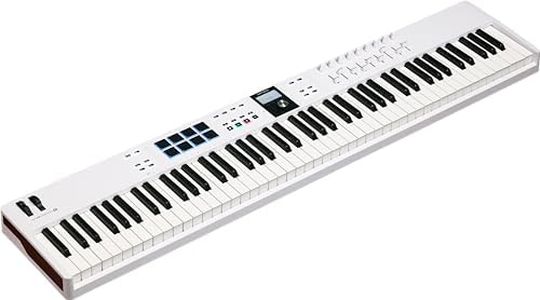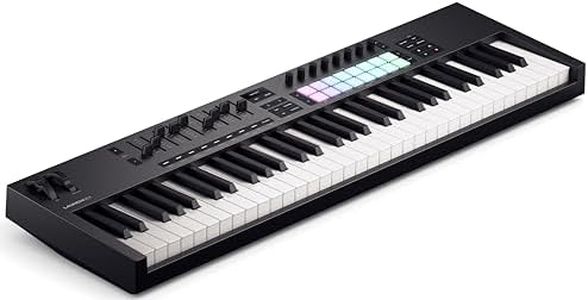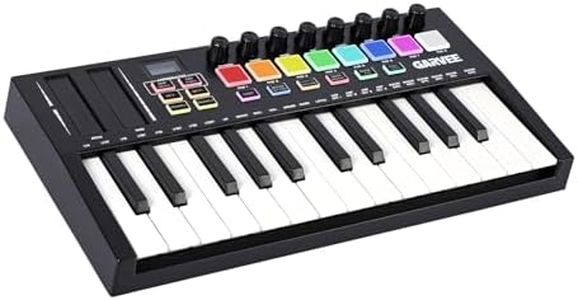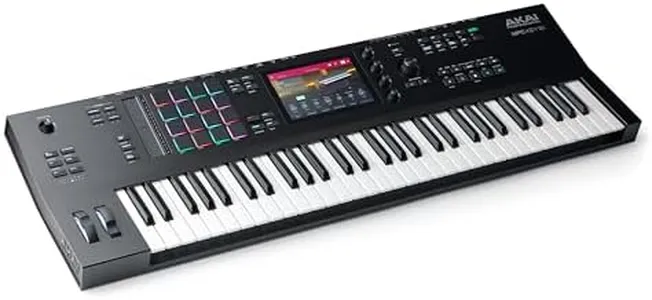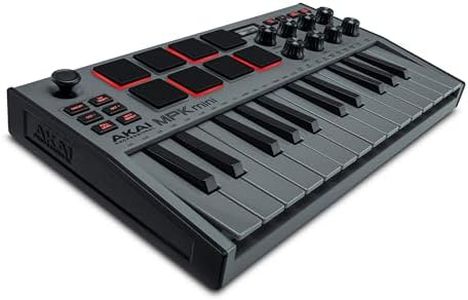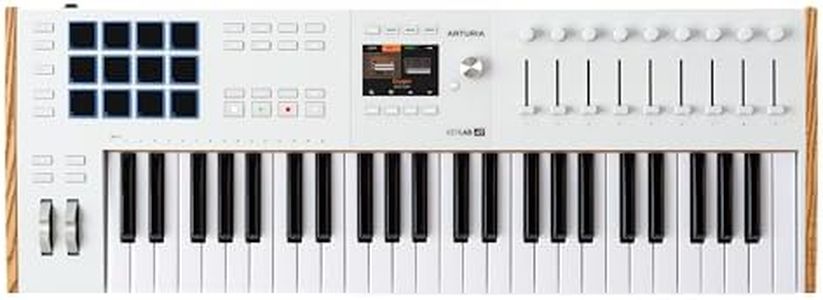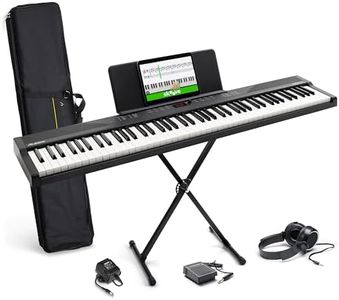10 Best Midi Keyboards 2026 in the United States
Our technology thoroughly searches through the online shopping world, reviewing hundreds of sites. We then process and analyze this information, updating in real-time to bring you the latest top-rated products. This way, you always get the best and most current options available.

Our Top Picks
Winner
Akai Professional MPC Key 37 Standalone Production Synthesizer, Drum Machine, MIDI Keyboard, with Wi-Fi, Bluetooth, Touchscreen, Plug-ins, and Native Instruments Integration
Most important from
217 reviews
The AKAI Professional MPC Key 37 is a versatile midi keyboard that stands out for its functionality as a standalone production workstation. It features 37 full-size synth-action keys that are responsive and equipped with aftertouch, making it a good option for musicians who value expressive playing. The inclusion of Wi-Fi and Bluetooth connectivity is a significant advantage, enabling easy integration with various devices and software, which is great for modern music-making environments. The 7-inch touchscreen enhances usability, providing an intuitive interface for navigating through options and settings. Furthermore, its robust production features, like the 16 velocity-sensitive RGB pads and various control knobs, allow for dynamic beat-making and sound manipulation, appealing to both producers and beat makers.
On the downside, the build quality, while generally solid, may not feel as premium as some competitors, which could affect long-term durability for frequent users. Its portability is decent, but with a weight that might not be ideal for on-the-go musicians. The 37-key range is suitable for many styles, yet may feel limiting compared to larger keyboards if you are looking to play complex pieces or need extensive octave range. Additionally, while the device supports numerous plug-ins and software compatibility is strong, beginners might find the learning curve steep without prior experience with similar devices.
The AKAI MPC Key 37 is an excellent choice for producers and beat makers looking for an all-in-one solution with cutting-edge features. However, those requiring a more extensive keyboard range or a more premium feel might need to consider their options carefully.
Most important from
217 reviews
Novation Launchkey 49 MK4 – 49 key Semi-Weighted, USB, MIDI Keyboard Controller with DAW Integration. Chord & Scale Modes, 8 Drum Pads, & Arpeggiator — Includes Software Bundle for Music Production
Most important from
4164 reviews
The Novation Launchkey 49 [MK4] is a 49-key semi-weighted MIDI keyboard controller designed for musicians and producers looking for a versatile and user-friendly tool. One of its standout strengths is its seamless integration with all major digital audio workstations (DAWs), making it an excellent choice for users of Ableton Live, Logic, Cubase, Reason, Reaper, FL Studio, and Ardour. This controller is equipped with 16 responsive FSR pads that can be used for drumming, clip launching, and more, adding to its versatility.
The inclusion of Scale and Chord modes and an arpeggiator helps users create complex musical ideas easily, even if they are not classically trained musicians. Additionally, the Launchkey 49 comes with a software bundle that includes Ableton Live 12 Lite and various instruments and effects, providing newcomers with a comprehensive music production setup right out of the box.
On the downside, while the semi-weighted keys offer a good balance between sensitivity and feel, they may not satisfy users accustomed to fully weighted keys, typically found in higher-end keyboards. Moreover, the build quality and portability, while decent, may not be as robust as professional-grade models. Nevertheless, the USB connectivity is straightforward and hassle-free, but users should ensure their setup is compatible. The Novation Launchkey 49 [MK4] is a highly capable and accessible MIDI keyboard suited for both beginners and experienced users looking for a feature-rich yet affordable controller.
Most important from
4164 reviews
Akai Professional MPK Mini Plus - USB MIDI Keyboard Controller with 37 Mini Keys, 8 MPC Pads, Sequencer, MIDI/CV/Gate I/O, Music Production Software and Native Instruments Sound Package
Most important from
1931 reviews
The Akai Professional MPK Mini Plus is a compact MIDI keyboard controller that stands out with its 37 mini keys, making it a great choice for music producers looking for portability without sacrificing functionality. The keybed allows for three full octaves, which is ideal for melodic and harmonic performance. It's USB powered, ensuring easy connection to your laptop or studio setup, and it includes MIDI, CV, and Gate I/O for advanced connectivity, appealing to those working with modular synths and various sound sources.
One of the highlights is its built-in 64-step sequencer that enables users to compose music without needing a computer. This feature, along with its 8 responsive RGB MPC pads, allows for dynamic performance across different musical styles. The transport section simplifies controlling your DAW, making it user-friendly for navigating sessions.
The assignable rotary knobs enhance control over your mixing and production, allowing for precise adjustments to EQ and volume. Moreover, it comes with MPC Beats software, which offers a wealth of drum samples and presets, catering to electronic music creators.
